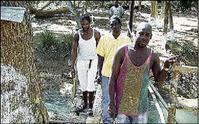Paul H. Williams, Sunday Gleaner Writer
The water that runs in the Rio Minho is always inviting and scenes like this one can be observed every day. - Photos by Paul H. Williams
Somewhere between Manchester and Clarendon, there is a roadside district called Scotts Pass. The main road to Porus, Manchester, runs through it, and is lined with shops and bountiful fruit stalls. A river, which forms a shallow pool near the road, runs parallel to the bauxite rail. It is normally a quiet village except for the horrendous noise that comes from the bauxite trains. There is not much to do as the community is bereft of many social amenities, so residents just have to make do with their limited resources.
On a lazy Saturday, January 26, on the way from an interview, this writer happened upon a scene reminiscent of his barefooted childhood days. There were some barefooted children playing cricket with makeshift bats, balls and wickets, and without any protective gear.
Cricket

Crossing the makeshift wooden bridge erected at the Pon Di River fruit stop in Scotts Pass, Clarendon.
There they were, six or more young boys, without a care in the world, batting, and bowling, and catching on a pitch of brown dirt, gravel and stones, with the rail track forming the boundary for the sixes. But, it was the wickets that caught my eyes more than anything else. The stumps were arranged as a pyramid, with no bails.
Yet another thing which was reminiscent of my road cricket-playing days was that the bigger and more skilful boys teamed up against the younger ones. So, as The Sunday Gleaner camera clicked away capturing some of those glorious moments in time, the bats smacked the ball, and the younger ones scampered in futility, perhaps, to get a chance to bat. Country cricket hasn't changed; it is still delightful.

One of the many fruit stalls that punctuate the main road and the rest of the area immediately surrounding Pon Di River in Scotts Pass, Clarendon.

